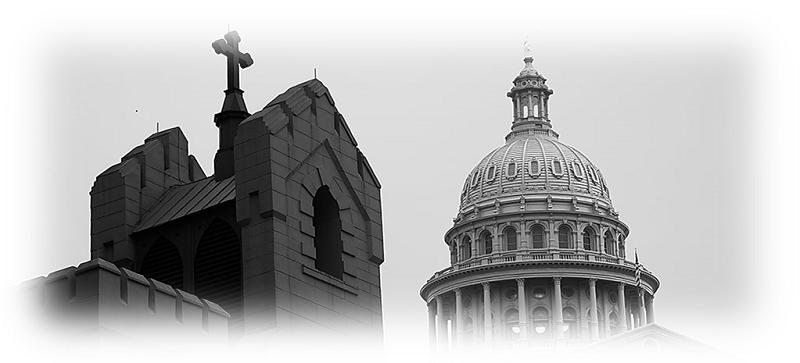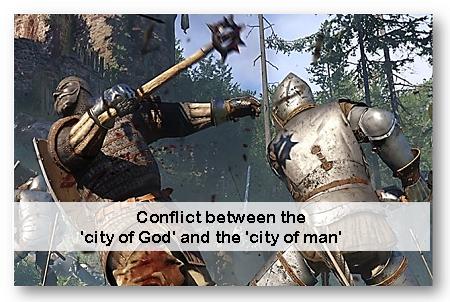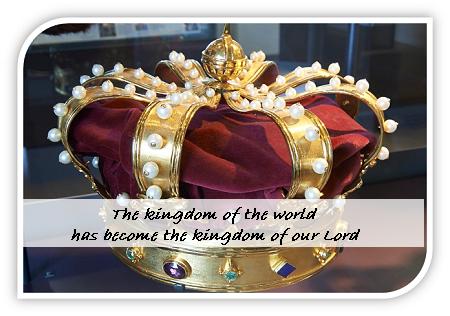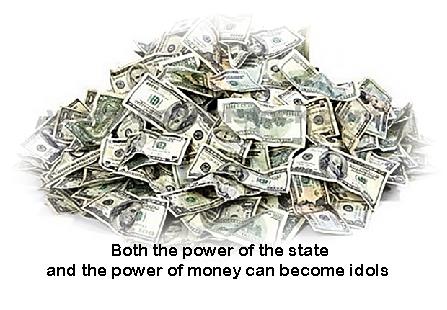Church and State in the Belgic Confession
Church and State in the Belgic Confession

Christian confessions are timeless in their message. They articulate the church's lasting proclamation of the Word of God, and give voice to the believing soul's communion with God in an ever-changing world. It appears that Article 36 of the Belgic Confession is different. It makes declarations about the task of civil government. But does it still have something relevant to say about civil government today?
In our time, the state is almost universally seen, not as divinely ordained, but as a human institution, arising from a social contract between the governors and the governed, with a strict separation of powers between church and state. How then do we make sense of the article's call that kings and rulers "protect the true religion and destroy all false worship"? This 16th century text appears to cross the boundary between church and state, and leaves uncomfortable associations with various forms of theocracy, such as Sharia law. We will only understand the relevance of Article 36 if we see it for what it is: an expression of faith, and not a socio-political declaration. The continuing actuality of this centuries-old statement does not lie in the elevated insights of John Calvin or Guido de Bres, but in the fact that it echoes the teaching of the Scripture: the canon of the Bible, specifically the New Testament. By going back to the source of our faith, we gain new insights, relevant for contemporary Christian social and political thinking and action.
Text And Context⤒🔗
The Sixteenth Century: An Era of Transition←↰⤒🔗
Article 36 of the Belgic Confession must be read in its historical context. It was written in the 16th century, a period of transition between medieval and modern models of the state. This period saw a transition from divine to human sovereignty, from theocracy to democracy.
The world-view of Thomas Aquinas was unitary: all of reality – including the social order – was governed by God's creation ordinance: human law was derived from natural law, and ordained for the common good.1 Aquinas drew heavily on Aristotle: the creation of a polis (political community) was a natural goal of mankind. Even if there had been no Fall, argued Thomas, there would always have been a need for civil rule. This was in contrast to Augustine, for whom there was a polarity of conflict between the 'city of God' and the 'city of man'. He regarded civil authority as a divine intervention against evil, rather than as an institution rooted in creation.2 Aquinas saw church and state as complementary, with the spiritual authority of the church prevailing over the civil authority of the state. Since the Church was societas perfecta, it set norms for the creation of public order. This presumed dominance of the church over the state created an ongoing tension, typified by the power struggles between Emperor and Pope during much of the Middle Ages.
While the Reformation was primarily a theological and ecclesiastical revolution, it also had farreaching political ramifications. With the pope no longer seen as the 'vicar of Christ' the state was freed from the domination of the church, and based its legitimacy directly on the Bible.
Luther rejected the Aristotelian model of civil governance, and returned to the Scriptures and to Augustine: the state was not a creation ordinance, but a divine response to sin. There would be no need for kings and rulers if all people were Christians. Be that as it may, at the beginning of the 16th century the legitimacy of the state was still theologically based. The Reformers were certainly no democrats, replacing the sovereignty of God with that of the people. It was the mediating role of the church that they challenged. This in turn diminished the unifying force of the church in society. Faith and politics were still conjoined twins, and to disconnect the two would prove to be a delicate and difficult operation.

The state existed to promote the welfare of its citizens, and their spiritual welfare also. Caring for the true religion (curiae religionis) was included in caring for the welfare of one's subjects, for which the ruler was accountable to God. Article 36 is consistent with Calvin's plea that "a public form of religion may exist among Christians, and humanity among men". For Calvin, the common good and true religion were two sides of the same coin.3
Gradually, this view of the state changed. The Calvinist Johannes Althusius (1557-1638) spoke of a social compact, describing society as a system of human covenants. He began to develop the concept of 'separation of powers', and was one of the forerunners of the concept of the sovereignty of the people. This in contrast to Luther's (and to a lesser extent Calvin's) view of the absolute power of the ruler.
By the 17th century, the awareness matured that the ruler must remain aloof from religious divisions. There was no place for religious warfare, and religious differences were increasingly confined to the churches themselves.
Article 36 must be read against a background of the decay of the republica christiana and the transition from medieval absolutism to the 17th century concept of state sovereignty. In the 18th century, the concept of the secular state arose, and with it, the beginning of the end of a unified Christian culture. The secularising state, the diversity of confessions and Enlightenment philosophy were all dynamic and mutually influencing developments.
Judgment and Discernment←↰⤒🔗
We are now in the 21th century. The French Revolution has completely reshaped the European political landscape. Democracy, multiparty systems, separation of church and state, and religious pluralism have become social realities. Religious tolerance is taken for granted. Europe is largely secularized, and institutional religion has lost its dominance. This tremendous shift changes the perspective of the discussion. I mention the contribution of two contemporary ethicists. The Dutch theologian Gerrit de Kruiff sets aside the theocratic view. To him, the state is a 'human endeavour'.4 He is wary of striving for a 'Christian society', which assigns a dominant political role to Christians. Scripture does not give a normative description of the ideal state. This, of course, does not give the state a free hand, and Christians must remain vigilant for dangerous excesses.
Oliver O'Donovan offers a deeper theological perspective. Political activity is rooted in Scripture, in the analogy between God's rule and human rule.5 Together with O'Donovan, I believe that 'Judgment', the basic act of moral discrimination, is a critical aspect of civil government. It is mentioned in Romans 13, expressed in Article 36, and deeply rooted in Calvin's political ethics. To Calvin, government is about the law and the magistrates, who are a 'living law'6 'Justice' is about protecting the good from the wicked, distinguishing right from wrong. It is wisdom, applied in an ever-changing world. Current events must be interpreted in their deeper theological meaning. In Biblical terms, we must 'discern the spirits' (1 Cor 12:10). How can Article 36 assist us in creating such a framework of values and interpretation?
Back To the Source←⤒🔗
The Bible and the Language of Faith←↰⤒🔗
Article 36 begins with: "I believe": it is an expression of faith, not a political-juridical statement, and the text must be honoured as such. With the eyes of faith, we see the rule of God behind civil rule, a spiritual dimension behind political events, a connection between heaven and earth. This dimension must be described in Biblical terms; hence Article 36 echoes the words of Scripture. This statement of faith begins with "our gracious God" (nostre bon Dieu). The goodness of God comes first, standing in contrast to the wickedness of man, restraining evil. The civil authorities exist "because of the depravity of mankind". Our gracious God uses civil authority "in order that the licentiousness of man be restrained and that everything be conducted among them in good order". It acts to restrain chaos and promote good order.

In contrast to the Roman Catholic view, the Reformed confessions regard civil authority not as arising from man as a social being; it is a response to the sinfulness of man. To restrain wickedness the civil authority may use force to "punish wrongdoers and protect who do what is right". Behind the terror of the sword stands a just and gracious God.
Article 36 explicitly uses the eschatological and apocalyptic language of the New Testament. The goal is "that the kingdom of Christ may come" and the removal of false worship serves "the destruction of the kingdom of antichrist." The task of Christians is an indirect one: to watch over civil authority, so that it protects the church and its ministry. Luther, Calvin and de Bres alike all stressed that only the preaching of the Word could effectively combat false teaching. The Word of God is the first and chief sword, since by means of its proclamation evil is repelled and the kingdom of antichrist is destroyed.
Mankind and Spiritual Reality←↰⤒🔗
Article 36 refers to 'mankind', a created and ordered social reality. As a generation in revolt against a gracious God, mankind has become a plaything of greater powers. For 'mankind', the New Testament often uses the encompassing term 'kosmos', a world that holds to its own values and wisdom (1 Corinthians 1:20), opposed to the values and wisdom of God (1 John 2:15-16). Christians may not conform to the pattern of this world, but must be transformed by the renewing of their minds (Romans 12:1, 2).
The 'kosmos' forms the stage for higher powers.7 The life of individuals is influenced by the greater structures of society, and these in turn are under the influence of higher spiritual entities. This threefold layering we find with Paul:
And you were dead in the trespasses and sins (level 1) in which you once walked, following the course of this world, (level 2) following the prince of the power of the air, the spirit that is now at work in the sons of disobedience (level 3).Ephesians 2:1, 2, ESV
What appears to be rebellious freedom actually follows a predetermined pattern, "the course of this world". A neutral zone does not exist. Evil transcends both the individual and the structures of this world. Our struggle is "against the rulers, against the authorities, against the powers of this dark world and against the spiritual forces of evil in the heavenly realms", Ephesians 6:12. In relation to this threefold reality, God uses fallible civil authority to restrain evil in this world.
Our submission to civil authority rests on the fact that "the authorities that exist have been established by God" (Romans 13:1). Here, Article 36 rightly highlights the providence of gracious God. However, the authorities instituted by God are open to the influence of spiritual powers. Next to the reassuring words of Romans 13, we must also read the ominous language of Revelation 13. There, civil authority has become totalitarian, and demands to be worshipped. Still, in the end God will conquer all those kingdoms.
The kingdom of the world has become the kingdom of our Lord and of his Christ, and he will reign forever and ever.Revelation 11:15
Modern man finds it hard to deal with this Biblical language. However, a theological social ethic takes account of this transcendent dimension. In his Christ and the Powers Hendrikus Berkhof revived this theological approach.8 He sees the powers as 'the framework of creation, preserving it from disintegration' and 'the dam which prevents the chaotic deluge from submerging the world'. To him, these powers manifest themselves in human traditions, societal institutions and authorities, without which life would be impossible. However, these powers can have a negative as well as a positive side. They create order, but they could also alienate us from God. In that case, the powers become idols (Galatians 4:8). They become a "barrier between the Creator and his creation".

The Third Level of Christian Social Ethics←⤒🔗
Between Liberation Theology and Charismatic Evangelicalism←↰⤒🔗
Berkhof's argument has been quite influential. The Mennonite John Howard Yoder took it over and concluded that the Christian's calling is to live within the new order, the church, God's people, rather than to participate in political power.9 Similarly, the integrated world-view of Walter Wink steers a course that is radically opposed to materialism: the core of all reality, including political and corporate reality, is spiritual.10 And in his social ethics, Stephen Mott points in a similar direction:
The biblical concepts of cosmos and the supernatural powers constitute an objective social reality that can function for good or evil.11
Both the second and the third layers can be found in Article 36, and they provide an especially useful corrective for our time.
One the one hand, Protestant pietism and evangelicalism, with their emphasis on personal sin and individual salvation, have often had a blind spot for the evil present in social and political structures. The direct connection laid between personal sin and higher spiritual powers often leads charismatic variants of evangelicalism into a kind of Gnostic spirituality, which imagines that structural problems can be solved by way of exorcism. Hence, the growing interest in so-called "deliverance ministry". In itself, the theme of 'spiritual warfare' is not wrong, but it deserves better theological reflection into what it actually means.12 By contrast, 'liberation theology' focuses its attention exclusively on structural evils. The weakness of the liberation agenda is its entirely horizontal view of reality and, in the footsteps of Bultmann, its one-sided emphasis on the social and moral message of the gospel.13 The problems of the world are socially immanent, and can only be solved by social action.
Whenever we return to our sources in Scripture and the old confessions, we see that the realities of this world can only be understood within the greater framework of a temporally transcendent reality. Institutional and social structures that go far beyond the powers of individuals are often the instruments of higher powers. The 'system maintenance' of global organizations leaves the individual as no more than a plaything of the system. Mindless drifting on the stream of social trends blinds people to structural evils that bring misery to millions of human beings.
Karl Barth←↰⤒🔗
I conclude by referring to the work of Karl Barth. Both his Römerbrief and his Christengemeinde und Bürgergemeinde stand in the Reformed tradition: civil authority exists, not because man is a social being, but because man is a sinful being. It exists to punish evildoers (Romans 13:3; 1 Peter 2:14).14 For Barth, civil authority is not a product of sin, but arises from God's gracious providence to counter the power of sin. It belongs to the powers of the angels. In his Das christliches Leben, Barth explores the struggle for human justice more deeply. Here, he discusses social ethics in the light of the Lord's Prayer. He unifies prayer and ethical behaviour, since the petitions of the prayer stand in stark contrast to the reality in which we live. In their prayer for the Kingdom of God, the zeal of Christians for God finds expression in their struggle for human justice, a struggle against evil and for humanity.15 This struggle is not only unavoidable, it is by direct command of God himself. Christians stand in conflict with chaos. They have fixed their eyes on the Kingdom of God, and cannot but rebel against evil, transcending their personal struggles, and devoting themselves to the greater struggle of their Creator, who desires to give life to all men. This warfare is not waged with physical force, but with witness, patience and faith. It is more than just human, says the New Testament: it is a struggle against demonic powers. The rationalist 'disenchantment' of reality has blinded us for the higher powers that are hidden behind immoral social structures.
Alienated from God, says Barth, mankind lives a life without God. But he has not become master of his own life. The promise "you will be like God" (Genesis 3:5) has never and will never come true. The more mankind emphasizes its own autonomy, the more enslaved it is to those 'nameless powers'.16 These powers have escaped human control; they manipulate us more than we master them, and have become the source of our alienation.

Conclusion←⤒🔗
We cannot do without a critical theological examination of developments in society. Why have we, for so long, been blind to the horrors of slavery? Are we just as blind today to the misery of child labour and human trafficking?
Both the power of the state and the power of money can become idols. At the same time, our gracious God is pleased to use civil authority to restrain the power of money. State intervention in economic processes is often necessary. In Adam Smith's model, the profit motive is self-regulating, and a laissez-faire economy should be free from state intervention. However, recent financial crises have shown us the importance of legal frameworks to restrain personal greed and promote the common good. This too is a relevant application of Article 36. The need for governments to 'restrain the licentiousness of men' applies to financial systems also.
Still, the most important instrument given by God is not government, but his church. The church of Christ has been set free from all kinds of powers. It does not have the capacity within itself to break these powers, but as a liberated people, it proclaims to these same powers the manifold (multi-coloured!) wisdom of God (Ephesians 3:10). Such a proclamation can only arise from a moral basis. In the words of Berkhof:
We can only preach the manifold wisdom of God to Mammon if our life displays that we are joyfully freed from his clutches.17

Add new comment